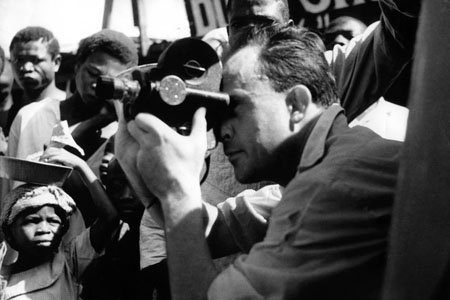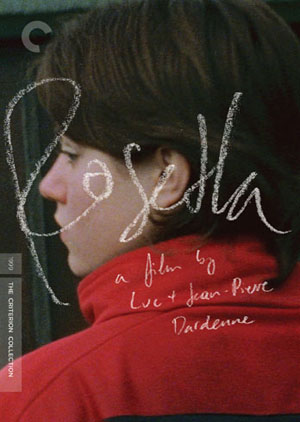“For the first time,” announces Eugene Hernandez for the Film Society of Lincoln Center, “the New York Film Festival will open with a 3D film when the World Premiere of Ang Lee’s Life of Pi [trailer] kicks off the fest on Friday, September 28. The New York-based filmmaker will be welcomed back to NYFF to launch the landmark 50th edition of the festival.”
In other news. Icarus Films has acquired North American rights to six films by Jean Rouch: “A founder of cinéma vérité, Rouch is widely recognized as one of the world’s most significant documentary filmmakers, but much of his filmography has long been unavailable in the United States.” So two shorts, Les Maîtres Fous (The Mad Masters, 1955) and Mammy Water (1956), and four features, Moi, un noir (1957), La chasse au lion à l’arc (The Lion Hunters, 1965), Jaguar (1967), and Petit à Petit (Little by Little, 1969), will be featured in a two-part, 40-film Rouch retrospective held at French Institute Alliance Française and Anthology Film Archives between from November 7 through 27. “The retrospective will be followed by a North American tour, stopping at venues including The National Gallery of Art in Washington, D.C., and the Pacific Cinematheque in Vancouver.” For more on Rouch and his work, see the fine tribute site set up by Documentary Educational Resources.
Reading. TCM’s Summer Under the Stars series is running all month and tomorrow is devoted to Lillian Gish, an occasion for Susan Doll to revisit a tale involving her, D.W. Griffith and two of his films, The Idol Dancer (1920) and The Greatest Question (1919), an “adventure [that] became one of those strange bits of movie lore in which the truth was buried in half-baked accounts and glossed-over retellings.”
In the Guardian, Francis Ford Coppola and Stewart Copeland look back on making Rumble Fish (1983).
For the Los Angeles Review of Books, Lauren Eggert-Crowe talks with Miranda July about It Chooses You, “a collection of narratives, interviews, and personal essays reflecting the various Los Angeleses within the city.”
Chatting each other up in Interview: Rachael Horovitz and Albert Maysles and James Franco and Mila Kunis.
DVDs/Blu-ray. In Slant, Glenn Heath Jr. recommends Criterion’s release of Jean-Pierre and Luc Dardenne’s Rosetta (1999), “a singular story of survival and relentless persistence, burns with the kind of immediacy that will make it forever relevant.” And Jaime N. Christley on the latest release of Renoir’s 1937 classic: “Lionsgate makes a play for prestige cred with another entry in their StudioCanal Collection, and their superb disc for La Grande Illusion will wipe away any salty tears that it doesn’t carry the Criterion logo.” Update: Criterion’s running essays by Kent Jones on the Dardennes’ La promesse (1995), also out today, and Rosetta.
New York. The United States has produced ‘more than 500,000 ‘ephemeral films’ (a term coined by American archivist Rick Prelinger, who also gave the statistic), short works created to advertise, promote, educate, and even entertain, and made both by corporations and by private individuals.” At the House Next Door, Aaron Cutler interviews Caroline Martel, whose video installation Industry/Cinema, “which opened at the [Museum of the Moving Image] in May and whose run was recently extended until October 28, places ephemeral films alongside more familiar ones. Visitors can follow up to seven short juxtapositions of film images, and select which side to listen to by pressing a button on a pair of headphones. Charles Chaplin works an assembly line while Chicago factory workers labor; HAL 2000 speaks in dialogue with phone-company promo films like those Stanley Kubrick and collaborators studied in order to construct the computer; an announcer tells listeners that telecommunications is transporting them into the future, while a young Jeff Bridges transforms digitally within the electronic world of 1982’s TRON. The overlapping sounds and images show and tell how much the two sets of movies have fed off of each other.”
In the works. Deadline‘s Mike Fleming broke a big one yesterday when he reported that Christoph Waltz will be starring in Terry Gilliam’s next film, The Zero Theorum: “Waltz will play Qohen Leth, an eccentric and reclusive computer genius plagued with existential angst who works on a mysterious project aimed at discovering the purpose of existence—or the lack thereof—once and for all.”
Also: “Breaking Bad star Aaron Paul has been set to star in Long Way Down, the Paschal Chaumeil-directed adaptation of the Nick Hornby novel.”
And from Deadline‘s Nellie Andreeva: “In her first major behind-the-camera foray into television, Jodie Foster is set to direct and executive produce Angie’s Body […which…] centers around a shrewd, sexy and, when necessary, lethal woman who runs a family-based crime syndicate.”
For news and tips throughout the day every day, follow @KeyframeDaily on Twitter and/or the RSS feed. Get Keyframe Daily in your inbox by signing in at fandor.com/daily.





